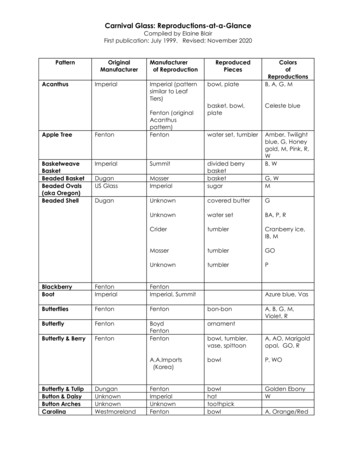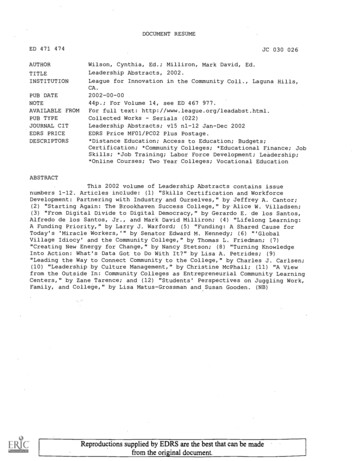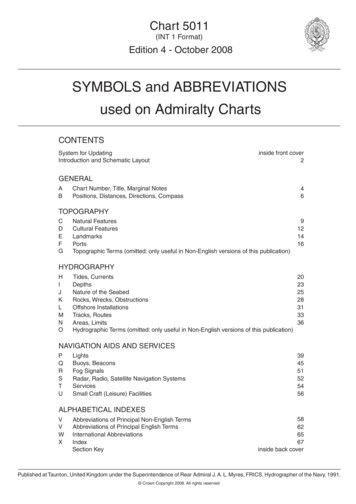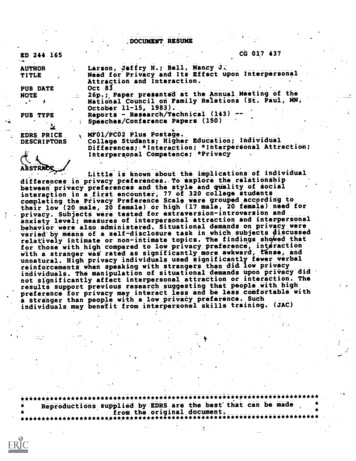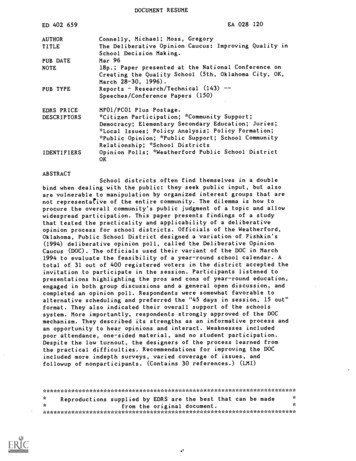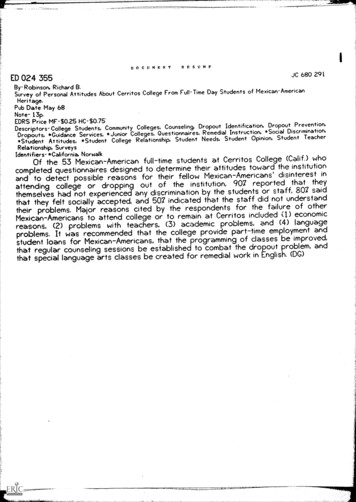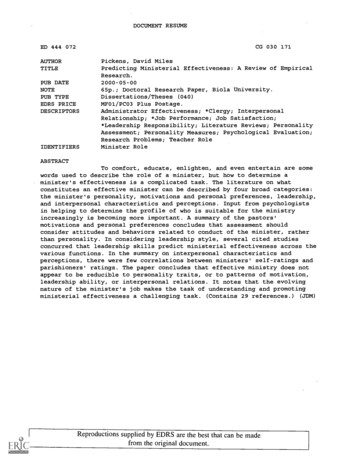
Transcription
DOCUMENT RESUMECG 030 171ED 444 072AUTHORTITLEPUB DATENOTEPUB TYPEEDRS PRICEDESCRIPTORSIDENTIFIERSPickens, David MilesPredicting Ministerial Effectiveness: A Review of EmpiricalResearch.2000-05-0065p.; Doctoral Research Paper, Biola University.Dissertations/Theses (040)MF01/PC03 Plus Postage.Administrator Effectiveness; *Clergy; InterpersonalRelationship; *Job Performance; Job Satisfaction;*Leadership Responsibility; Literature Reviews; PersonalityAssessment; Personality Measures; Psychological Evaluation;Research Problems; Teacher RoleMinister RoleABSTRACTTo comfort, educate, enlighten, and even entertain are somewords used to describe the role of a minister, but how to determine aminister's effectiveness is a complicated task. The literature on whatconstitutes an effective minister can be described by four broad categories:the minister's personality, motivations and personal preferences, leadership,and interpersonal characteristics and perceptions. Input from psychologistsin helping to determine the profile of who is suitable for the ministryincreasingly is becoming more important. A summary of the pastors'motivations and personal preferences concludes that assessment shouldconsider attitudes and behaviors related to conduct of the minister, ratherthan personality. In considering leadership style, several cited studiesconcurred that leadership skills predict ministerial effectiveness across thevarious functions. In the summary on interpersonal characteristics andperceptions, there were few correlations between ministers' self-ratings andparishioners' ratings. The paper concludes that effective ministry does notappear to be reducible to personality traits, or to patterns of motivation,leadership ability, or interpersonal relations. It notes that the evolvingnature of the minister's job makes the task of understanding and promotingministerial effectiveness a challenging task. (Contains 29 references.) (JDM)Reproductions supplied by EDRS are the best that can be madefrom the original document.
CGPREDICTING MINISTERIAL EFFECTIVENESS:A REVIEW OF EMPIRICALRESEARCHA Doctoral Research PaperPresented tothe Faculty of the Rosemead School of PsychologyBiola UniversityU.S. DEPARTMENT OF EDUCATIONOffice of Educational Research and ImprovementEDUCATIONAL RESOURCES INFORMATIONCENTER (ERIC)This document has been reproduced asreceived from the person or organizationoriginating it.Minor changes have been made toimprove reproduction quality.Points of view or opinions stated in thisdocument do not necessarily representofficial OERI position or policy.In Partial Fulfillmentof the Requirements for the DegreeDoctor of Psychology"PERMISSION TO REPRODUCE THISMATERIAL HAS BEEN GRANTED BYP/c.6-7.tiTO THE EDUCATIONAL RESOURCESINFORMATION CENTER (ERIC)."bYDavid Miles Pickens100May, 20002BEST COPY AVAILABLE
PREDICTING MINISTERIAL EFFECTIVENESS:A REVIEW OF EMPIRICALRESEARCHbyDavid Miles PickensAPPROVED:, .434e4,11ei g-0Todd W. Hall, PhDDateDateBrian Misaka, PsyDAPPROVED:Pat 'cmPike, Dean51/740Date3,c/7/av
Copyright 2000 by David Miles Pickens4
ABSTRACTPREDICTING MINISTERIAL EFFECTIVENESS:A REVIEW OF EMPIRICALRESEARCHbyDavid Miles PickensThis paper reviews the empirical research related to the question: Whatconstitutes an effective minister? The literature falls into four broadcategories: the minister's personality, motivations and personal preferences,leadership, and interpersonal characteristics and perceptions. The research ineach area is critically reviewed and summarized, and directions for futureresearch are suggested.iii
TABLE OF CONTENTSPAGEDOCTORAL RESEARCH PAPERIntroduction1Overview of Methodological Difficulties4Personality Functioning as a Predictor5Summary of Personality as an Effectiveness PredictorPastor's Motivations and Personal Preferences1517Summary of Pastors' Motivations and Personal25Preferences26LeadershipLeadership Styles and Behaviors26Leadership Skills36Summary of Leadership Styles and Behaviors andLeadership Skills43Interpersonal Characteristics and PerceptionsSummary of Interpersonal Characteristics andPerceptions4552Discussion53REFERENCES58iv6
PREDICTING MINISTERIAL EFFECTIVENESS:A REVIEW OF EMPIRICALRESEARCHIntroductionThen Jesus came to them and said, "All authority in heaven and onearth has been given to me. Therefore go and make disciples of all nations,baptizing them in the name of the Father and of the Son and of the HolySpirit, and teaching them to obey everything I have commanded you. Andsurely I am with you always, to the very end of the age." (Matthew 28:18-20)And so the disciples' "seminary" experience was complete. After 3years with Christ, these eleven men, rough and tumble as they were, hadcertainly earned their Masters of Divinity degrees. Jesus, the expert regardinglove and ministry spent 3 years training his disciples. They ate, slept, laughed,and cried with one another. They argued regarding social, emotional, andtheological concerns. They even fought the "bad guys" (demons andPharisees) together. As an aspiring psychologist, I am intrigued by Christ'smethod of training and more than a bit surprised at his selection of students.How did Christ determine that these were the men for the daunting taskahead? Was He able to assess the likelihood of their success prior to theirselection? If so, upon what did He base such a decision? Intellect? Healthypersonality functioning? Previous leadership experience? I have some reason7
2to doubt each of these possibilities: The disciples' inability to abandon theirconcrete thinking to grasp the big picture, their narcissistic traits andpropensity towards impulsivity, and their less than adequate curriculum vitaestend to refute the aforementioned grounds for selection. The selection ofthese men appears rather complex, too complex.The temptation, therefore, is to give up. Yet, as early as the 1st century,the church has recognized the importance of critically accepting would-beministers. In the 5th century, St. Benedict would not allow entrance toprospective ministers unless they persisted "with patience the insults inflictedupon them" as they knocked at the monastery door for 5 days (Kling, 1958).Early church leaders obviously recognized the importance of eliminatingspurious ministerial candidates. And as we have experienced in recentdecades, the spiritual, emotional, and financial toll of a "false brother" can leavea church reeling for years. The local church and the denomination at largebear the responsibility of properly training and screening potential ministers.As the church, we are charged to both protect and edify the young in Christwhile also practicing good stewardship. Carefully considering those we trainand send as ministers is critical.Increasingly, since the 1930s, the church has called upon psychologiststo assist in determining those most suited for the ministry. Yet, delimiting theminister's responsibilities and daily activities is a difficult task. As the sayinggoes, "A minister must be ready to preach, pray, or die in a moments notice!"8
3But there is more. He or she is also called upon to comfort and chasten. Theyrejoice with newly-weds while containing the anger and hurt of numerousestranged couples. As a chaplain, he or she must minister to the sick and dyingwhile simultaneously celebrating with proud new parents. Behind the pulpit,he or she is expected to deliver a message that convicts, comforts, educates,enlightens, and even entertains a diversified crowd. He or she is the C.E.O. the"hire-fire guy," the administrator, the visionary, the disciplinarian, the spiritualleader, the counselor, the grounds crew, the maintenance man, ad infinitum. Heor she serves as a visible reminder of the One who transcends our finitelimitations. This eight lettered word, minister, encapsulates so much. Withsuch a vast array of responsibilities, roles, denominations, and church sizes, itbecomes difficult for the psychologist to identify which skills, abilities, andpersonality characteristics foster effective ministry. Additionally, churches arenot simply interested in a "capable" minister; their desire, rather, is an"effective" minister.The purpose of this paper is to review the empirical research related tothe question: What constitutes an effective minister? Journal articles anddissertations empirically investigating the effectiveness of ministers werereviewed. Studies regarding the personal functioning of pastors wereexcluded as they have been reviewed elsewhere (Hall, 1997). The Psych Litand Dissertation Abstracts International databases for the years 1974 to thepresent were searched. Reference sections of articles and dissertations9
4obtained were also searched for relevant articles. The literature falls into fourbroad categories, overlapping to some degree, but differing in focus: theminister's personality, motivations and personal preferences, leadership, andinterpersonal characteristics and perceptions. Prior to reviewing these threeareas, a brief overview of the methodological difficulties regarding thisresearch will be addressed.Overview of Methodological DifficultiesIncreasingly, over the last 30 years, the prediction of ministerialeffectiveness, rather than the simple elimination of neurotic seminarycandidates, has become the central task required of psychologists workingwith this population. With time and the benefit of trial and error, the churchhas become progressively more precise in its requests of the psychologist.Fortunately, psychologists have also become more adept in their approach tothis issue.While psychologists like Nauss and Malony have led the way inrefining testing procedures for ministerial candidates, other psychologists stillfall prey to the same procedural problems described by Dittes (1962) almostfour decades ago:Far more frequently than not, measurements have been made simply becausethe measuring instruments were available . . . . To measure effectiveness, gradepoint average in seminary or size of congregation or budget are still temptinglyavailable indices when more obviously valid indices require difficultdefinitional labor. To discover predictors of effectiveness, existing personalitytests - all neatly standardized and reliable - are temptingly available, evenI0
5when there is no conceivable basis for supposing that they measure anythingthat goes into becoming an effective minister. (pp. 144-145)Although several of the subsequent studies use grade point averageand predetermined psychological measures to assess effectiveness, most of theauthors have sought more valid criteria. Unfortunately, however, a consistentthread weaving throughout these studies is the attempt to correlate numberswith effectiveness. In other words, an increase in certain church statistics isviewed as representing effectiveness. Kierkegaard (1854) recognized this subChristian tendency years ago as he queried, "The disciple who became a fisherof men cast out his net and in one haul caught 3,000 souls-the Master duringhis whole lifetime caught only 12. Is the disciple greater than the master,then?" (p. 335). Though it is rather easy to answer "No!" regarding Christ'sministerial effectiveness, it seems more difficult to apply the samepresuppositions to our present-day ministers.Personality Functioning as a PredictorIn an attempt to ascertain the utility of psychological assessments inpredicting ministerial effectiveness, Malony and Majovski (1986) borrowedNauss' (1972) distinction between primary effectiveness and secondaryeffectiveness in their investigation of 87, full time United Methodist ministersfrom the Pacific-Southwest Conference. Primary effectiveness refers tospecific observable behaviors, whereas the latter has more to do withconsequences of the pastor's leadership (Nauss, 1972). Malony and Majovski
6used the Ministerial Effectiveness Inventory (MEI) to asses the minister'sprimary effectiveness. This measure will be described in some length shortly asit is commonly used throughout the studies reviewed here. The MEI wasmailed to the pastor, the District Superintendent (DS), and the Pastor-ParishRelations Committee (PPRC). The PPRC are members of the local church whowork closely with the minister regarding the life of the church. Secondaryeffectiveness was determined by the percent change of the followingvariables: membership, attendance, church school, salary, and giving (Malony& Majovski, 1986).The eight factors that comprise the MEI were considered to be the mostsalient dimensions emerging from a study conducted by Schuller, Strommen,and Brekke (1980). Schuller et al. polled 5,000 laity and clergy from 47denominations to gather 850 descriptions of ministry. From these descriptions,they were able to factor out the following 11 areas that contribute toministerial effectiveness: (a) having an open, affirming style; (b) caring forpersons under stress; (c) evidencing congregational leadership; (d) being atheologian in life and thought; (e) undertaking ministry from a personalcommitment of faith; (f) developing fellowship and worship; (g) havingdenominational awareness; (h) not having disqualifying personal andbehavioral characteristics; (i) evidencing ministry to community and world; (j)being priestly-sacramental in ministry; (k) and manifesting a lack of privatistic,legalistic style. The 11 factors have been organized into the Profiles of12
7Ministry (POM) inventory, whereas the first eight categories comprise the 59-item MEI used in the present study. Each rater was asked to respond to thefollowing question: "How characteristic is this [item] of your minister?" or ". . .of you?" (Malony & Majovski, 1986).Each minister included in this study had, previous to ordination andprior to this study, undergone a psychological evaluation consisting of theMMPI and the Inventory of Religious Activities and Interests (IRAI), whichassesses the minister's preference for performing 10 ministerial roles: counselor,administrator, teacher, scholar, evangelist, spiritual guide, preacher, reformer,priest, and musician. The psychologist serving as the psychological evaluator(PE) chose these instruments as he theorized that "greater normalcy" and"higher overall interest in ministerial roles" would correlate with effectiveness(Malony & Majovski, 1986). Based on these measures, but primarily theMMPI, the PE would recommend that the minister be either "accepted orrejected without condition" for ordination or he would recommend that theminister be "accepted or deferred" with a list of qualifications.When the PE's recommendations were compared to the measures ofeffectiveness, no significant correlations were found with either primaryeffectiveness (MEI) or secondary effectiveness. Since the PE had originallyconducted his assessment to screen the ministerial candidates, he was asked toreview his assessments and then place each candidate into a normaldistribution category of those most and least likely to succeed: 64% rated as13
8likely, 14% as more likely, 14% as less likely, 4% as most likely, and 4% as leastlikely to succeed. Once again, correlational analysis revealed no significantrelationships between the measures of effectiveness and the psychologist'srecommendations.Interestingly, however, a multiple regression analysis of primaryeffectiveness and the MMPI revealed the following negative predictors on theMMPI: 8% of the variance of the Pastor-PPRC ratings were accounted for bythe Mania (Ma) scale (R -0.29, F 4.000, df 1,91, p .05) and 11% of thevariance of the pastor's own ratings were accounted for by the PsychopathicDeviant (PD) scale (R -.33, F 7.87, df 1,91, p .01).Regarding secondary effectiveness, the Social Introversion (Si) scaleaccounted for 7% of the variance on the attendance variable (R 0.27, F 4.81, df 1,91, p .05). It was also noted that the DS and PPRC ratings weresignificantly positively related to three secondary measures: membership,attendance, and church school. This finding suggests that church membersand DSs tend to evaluate effectiveness based on "people participation."Based on the assumption that "personality enters decisively intoeffectiveness in any vocation dealing with people," Sue Webb Cardwell (1967,p. 4) hypothesized that the MMPI would measure some of the personalityvariables that predict an effective minister. Towards this end, Cardwell hopedto find whether special MMPI norms were needed for Protestant seminarystudents and whether certain MMPI scales, or combinations thereof, could14
9predict ministerial effectiveness.Cardwell used the MMPI scores of 76 students who began attendingChristian Theological Seminary (CTS) during 1963 and 1964. The means ofthe CTS student's scales exceeded the general population's means on all scaleswith the sole exception being Social Introversion (Si). The Hysteria (Hy),Psychopathic Deviate (Pd), Paranoia (Pa), Psychasthenia (Pt), Schizophrenia(Sc), and Mania (Ma) scales were more than half a standard deviation abovethe mean. The validity index, K, was likewise elevated. Moreover, it is likelythat 20% of the CTS students' Masculinity-Femininity (Mf) scales wouldexceed 98% of the population. Cardwell concluded that special norms arewarranted for the CTS population as their norms are sufficiently unique whencompared to the general population. Cardwell then compared the CTS normsto two other Protestant seminaries of different regions and found very littledifference. According to Cardwell's data, it does not appear necessary tocreate special norms for each specific seminary, but rather one set of normswhich would generalize to other Protestant seminaries. However, Cardwell'sdata is now more than 30 years old and may differ from current seminarynorms.In an attempt to assess the predictive validity of the MMPI, Cardwellaveraged the Grade Point Averages (GPA) of each student for two semestersand used this as the criterion for effectiveness. The student was also rated onthe Ministerial Effectiveness Scale (MES) by three faculty members and three15
10fellow students. These scores were then averaged. Only two scales, Mf (r .36, p .02) and Originality (r .29, p .05), significantly correlated withGPA. Ma (with K correction) significantly correlated with peer ratings at the.02 level (r .34). Peer ratings nearly correlated at the .05 level with GPA andintelligence, suggesting that fellow seminarians are impressed with high energyand ambition level, classroom performance, and verbal intelligence. Facultyratings were correlated with Ma and "Control" of the MMPI at the .05 level (r .30 and r .32, respectively) and with GPA and peer ratings at the .02 level(r .36 and r .34, respectively). Additionally, near significant correlationswere noted with Dominance (Do), the Language Factor of the California Testof Mental Maturity (CTMM), and (negatively) with Pa. These findingssuggest that faculty were also impressed with high energy and ambition level,intelligence, leadership, and classroom performance. Moreover, they werenegatively influenced by hypersensitivity and suspiciousness.Four equations, utilizing various scales from the MMPI and the CTMMLanguage Factor, were tested to see if they could predict GPA, which was thecriterion for effectiveness in this study. The following combinations resultedin prediction of students GPA at the .02 level: (a) The Masculinity-Femininity(MO, Ego Strength (Es), and Schizophrenia Validity (Sc K) scalescombined to account for a total of 30% of the variance of GPA; (b) combiningthe experimental scales Originality (Or), Role Playing (Rp), and Ego Strength(Es) accounted for 27% of the variance of GPA; (c) combining (MO and the16
11CTMM Language Factor accounted for a total of 29% of the variance of thecriterion; (d) the CTMM LF alone was also capable of predicting GPA. Again,however, the reader will want to note that the aforementioned combinationspredict only GPA. Cardwell is m
DOCUMENT RESUME. ED 444 072 CG 030 171. AUTHOR Pickens, David Miles TITLE Predicting Ministerial Effectiveness: A Review of Empirical. Research. PUB DATE 2000-05-00
